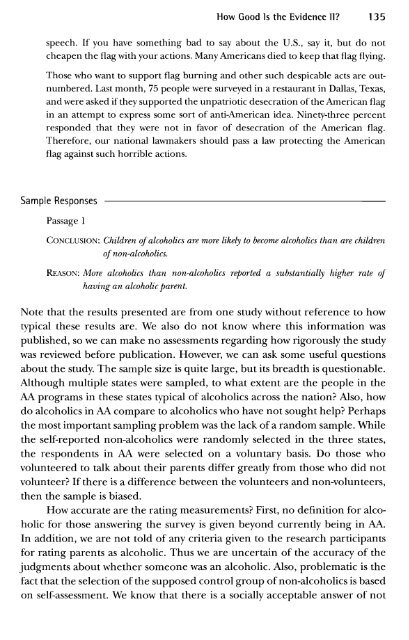Asking the Right Questions, A Guide to Critical Thinking, 8th Ed
Asking the Right Questions, A Guide to Critical Thinking, 8th Ed
Asking the Right Questions, A Guide to Critical Thinking, 8th Ed
You also want an ePaper? Increase the reach of your titles
YUMPU automatically turns print PDFs into web optimized ePapers that Google loves.
How Good Is <strong>the</strong> Evidence 11? 135<br />
speech. If you have something bad <strong>to</strong> say about <strong>the</strong> U.S., say it, but do not<br />
cheapen <strong>the</strong> flag with your actions. Many Americans died <strong>to</strong> keep that flag flying.<br />
Those who want <strong>to</strong> support flag burning and o<strong>the</strong>r such despicable acts are outnumbered.<br />
Last month, 75 people were surveyed in a restaurant in Dallas, Texas,<br />
and were asked if <strong>the</strong>y supported <strong>the</strong> unpatriotic desecration of <strong>the</strong> American flag<br />
in an attempt <strong>to</strong> express some sort of anti-American idea. Ninety-three percent<br />
responded that <strong>the</strong>y were not in favor of desecration of <strong>the</strong> American flag.<br />
Therefore, our national lawmakers should pass a law protecting <strong>the</strong> American<br />
flag against such horrible actions.<br />
Sample Responses<br />
Passage 1<br />
CONCLUSION: Children of alcoholics are more likely <strong>to</strong> become alcoholics than are child<br />
of non-alcoholics.<br />
REASON: More alcoholics than non-alcoholics reported a substantially higher rate of<br />
having an alcoholic parent.<br />
Note that <strong>the</strong> results presented are from one study without reference <strong>to</strong> how<br />
typical <strong>the</strong>se results are. We also do not know where this information was<br />
published, so we can make no assessments regarding how rigorously <strong>the</strong> study<br />
was reviewed before publication. However, we can ask some useful questions<br />
about <strong>the</strong> study. The sample size is quite large, but its breadth is questionable.<br />
Although multiple states were sampled, <strong>to</strong> what extent are <strong>the</strong> people in <strong>the</strong><br />
AA programs in <strong>the</strong>se states typical of alcoholics across <strong>the</strong> nation? Also, how<br />
do alcoholics in AA compare <strong>to</strong> alcoholics who have not sought help? Perhaps<br />
<strong>the</strong> most important sampling problem was <strong>the</strong> lack of a random sample. While<br />
<strong>the</strong> self-reported non-alcoholics were randomly selected in <strong>the</strong> three states,<br />
<strong>the</strong> respondents in AA were selected on a voluntary basis. Do those who<br />
volunteered <strong>to</strong> talk about <strong>the</strong>ir parents differ greatly from those who did not<br />
volunteer? If <strong>the</strong>re is a difference between <strong>the</strong> volunteers and non-volunteers,<br />
<strong>the</strong>n <strong>the</strong> sample is biased.<br />
How accurate are <strong>the</strong> rating measurements? First, no definition for alcoholic<br />
for those answering <strong>the</strong> survey is given beyond currently being in AA.<br />
In addition, we are not <strong>to</strong>ld of any criteria given <strong>to</strong> <strong>the</strong> research participants<br />
for rating parents as alcoholic. Thus we are uncertain of <strong>the</strong> accuracy of <strong>the</strong><br />
judgments about whe<strong>the</strong>r someone was an alcoholic. Also, problematic is <strong>the</strong><br />
fact that <strong>the</strong> selection of <strong>the</strong> supposed control group of non-alcoholics is based<br />
on self-assessment. We know that <strong>the</strong>re is a socially acceptable answer of not



